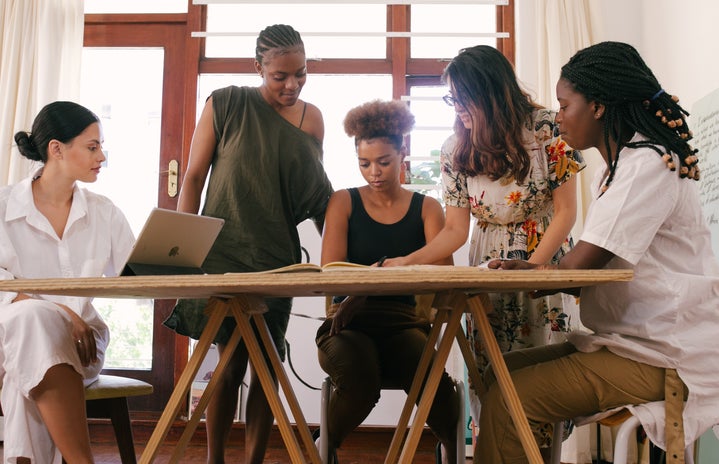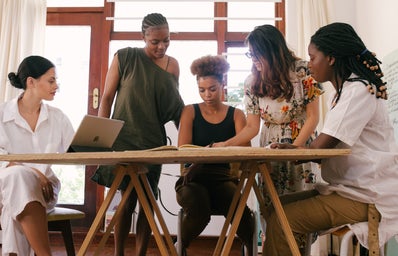Her Campus at Carleton was fortunate enough to host a Women in Digital Media panel, where we got the chance to speak with:
- Isabelle Docto: a multimedia journalist for the Daily Hive and with work in Chatelaine, CBC and the Toronto Star
- Angelyn Francis: an equity and inequality reporter for the Toronto Star and former video producer for Maclean’s
- Nelly Sérandour-Amar: an associate social media editor for Narcity Media and former digital media intern at Breakfast Television
- Tiffany Mongu: a multimedia journalist for CBC News Toronto, former reporter for Global News Toronto and current Black Fellowship recipient with the Canadian Journalism Foundation’s Black Fellowship program.
Each of these inspiring women gave excellent advice on what it’s like to enter and work in the media industry. Read their advice below to get your foot in the media world door!
How can women get their foot in the door of professional media and what challenges may arise?
Internships and making connections! The panellists were in agreeance that gaining experience through internships is a great way to make connections and grow your resume.
A big challenge in the media world is making a good income while working at your dream job. Docto said that to get started in the industry, you’ll probably have to work at some smaller organizations to gain viable experience to get into those big dream jobs.
“Those experiences kind of helped me…even though it wasn’t exactly what I wanted to do, getting your foot in the door in terms of making those connections in those big organizations,” Docto said.
Francis agreed that internships are very important. After doing two internships, she found that making connections with others is key.
“The connections really do help, because when I applied for an internship at HuffPost, the editor gave me an interview, but then she also called up my friend,” said Francis.
Doing your internships at non-peak times, like the end of fall, is a great time to get that experience, because Christmas break comes and you’ll likely get the chance to cover work and get more experience, according to Francis.
Francis also mentioned that a big challenge of the industry is layoffs: “Brace yourself for layoffs and learn not to take them personally.”
Sérandour-Amar also touched on the subject of internships and agreed they were key in getting experience before going back into the industry.
“Getting contacts in the media world is very, very important,” Sérandour-Amar said. “I also had to find contacts, so I would go to different meetups and there were a lot of times that I would go into some of these panels online, just like this.”
Another way to get your foot in the door is expanding your online presence and creating your personal platform. Mongu spoke about how this is something she is still working on, and something that is always changing throughout your career.
Since Mongu is not a live reporter and mostly produces content, the pieces she works on don’t always give her a byline.
“So I have to get on making a digital portfolio for people to check out my stuff. I tend to share a lot of my work [on Twitter], but I feel like having a website is something that could end up attracting employers,” Mongu said.
How can we build our confidence, Get inspired, and end imposter syndrome?
Imposter syndrome is rampant amongst those in the media industry and it’s no secret that it’s especially prevalent in younger workers. Our panellists assured us we were not alone and gave excellent advice on how to build up our confidence, most notably through self-reflection.
Docto opened up by explaining how she experiences anxiety frequently, and that going into journalism school as an introvert surrounded by many extroverted peers made it seem harder to move through the industry.
But, she still found ways to make it work for her living style: “…imposter syndrome is very real and you find yourself thinking, “Do I deserve to be here?” But taking a step back and knowing everyone has their own paths… you can also find ways to make it work for yourself,” Docto said.
Francis added that one way to become more confident is getting out of your head and stop questioning your abilities, especially when you want to pitch your ideas.
“I think it’s a cycle of talking to yourself, so if you take that out of yourself and talk to a friend, talk to a colleague, talk to an editor and just bounce the idea back and forth, I find that to be really useful,” Francis said.
Finding inspiration is another great way to pursue something you actually enjoy writing or covering, and will help boost your confidence, too! Mongu said that looking inwards towards your interests and looking outwards to what communities want to read is good practice.
“I just want to make sure that what I give out to an audience reflects stories that I want to see, especially with the Black community,” Mongu said.
Mongu added it’s a good idea to inspire yourself through mentors who are in the industry and speak with them about your career.
“Whenever I talk to [mentors] or we have discussions or have little chats about where I’m at right now in my career, it’s always things like “stand out, make a difference, be the change-maker.”
To further develop your inspiration, Sérandour-Amar said you should try to see what content the public enjoys and try to connect with that audience.
“Just think of what the audience would want to see, and you are the audience. I want to put something that I will find entertaining and that I could relate to,” said Sérandour-Amar.
If you could give your younger self advice what would you say?
Mongu had a simple answer for us: Try harder. She urges everyone to put themselves out there and try to get as much experience as possible.
“In the end it worked, but I would still tell myself to work harder. Stop looking in the books and put some time in your career instead of electives,” Mongu said.
Sérandour-Amar jumped back to the idea of imposter syndrome and said she would tell her younger self to trust her skills.
“When I was in university, I feel like I had imposter syndrome and I didn’t feel like I deserved to be in journalism school. I felt like I had to prove myself a lot, I would do that a lot but at the same time push myself down… so I think trust your skills. And that imposter syndrome–– throw it out,” Sérandour-Amar said.
Francis added there was a mix of things she would tell herself, but most importantly it would be to develop more discipline, make room for breaks and celebrate your wins. She also said to not feel like you need to “woo” or be intimidated by the people who have been in the industry for a long time, because soon you’ll be in those positions, too.
“Your network is also lateral and your peers are also really big legs up, and you’ll help each other throughout your days in the field,” Francis said.
Docto had a similar response to the rest of the panellists and said she would tell herself not to get in her own head.
“Just to not overthink it and freaking go for it! To not talk down on myself, celebrate those wins and also collaborate more with my friends,” Docto said.
Overall, the panellists have made it clear: Don’t get in your head, believe in yourself, make those connections and just try your best! If you want to learn more from our panellists, you can watch the full event on our new YouTube channel HERE!


